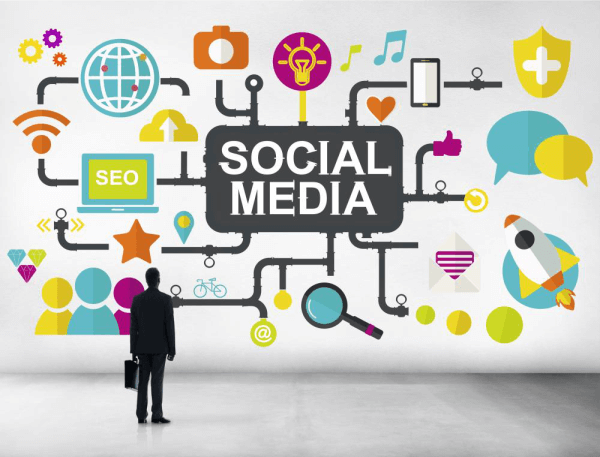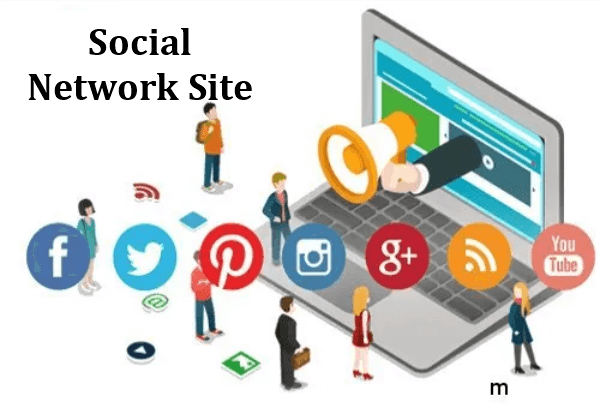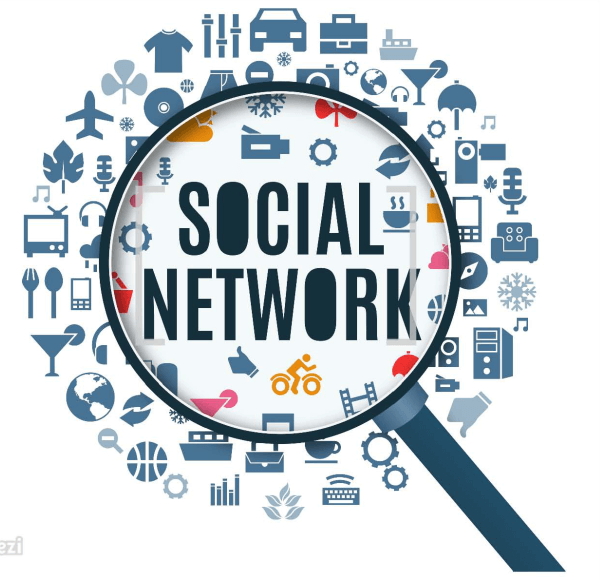Advantages and Disadvantages of Social Networking SitesSocial networking is typically a form of human networking or interacting on the Internet through different channels or platforms. On social networking sites, users can post their live activities, videos, and images. 
If you're an artist or a content creator, you can sign up for a free account on most social media sites and showcase your work there. You can allow comments on your postings from people who are interested in sharing their views about your art. By using social networking sites like Instagram, Twitter, Facebook, etc., people get to know you, and you can meet new people from all over the world who share similar interests as you. AdvantagesQuick and Straightforward Communication Methods No matter where we are, social networking allows us to stay in touch with one another. With today's technology, you can make calls without having a landline connection on your phone. Everything is now possible through social networking sites and the Internet. It feels like an eternity when you send a letter through to the regular mail these days. Forget voicemail or answering machines; just leave a comment on someone's social post or website, and they will be aware immediately. Every time we want to stay in contact with someone, all we need to do to start the conversation is pick up our smartphones, switch on the computer, or open the laptop. No issue where you are across the globe; you can utilize a social networking app or a platform through such devices and link to someone's profile to start the communication. Connecting with People from all around the World One of the most obvious advantages of using social networking sites is the opportunity to connect with people all around the world. You can add people as "friends" or "followers" and check in with them whenever you like as long as there is an Internet connection and a social profile has been made on social sites. Some people use Facebook to share their political views, connect with old high school friends, and contact their families. Twitter is a microblogging site where humour, news, and general musing are shared. You can even connect with people from nations you've never been to or visited before. Information is updated in real-time Blocks Earlier, we all used to wait for the regular daily newspaper or television newscast to know what was happening in the world on that day, till the advent of the Internet. Even after television news became accessible through the Internet and gave us 24-hour access to news, we still had to wait in queues to watch the stories we wanted to watch. However, with social networking sites, information is shared around the world like wildfire. Through social networking, we may now quickly get notifications of the most recent events we want to see. You can also go one step further and set up notifications using your social media profile settings to receive information anytime a specific page has new stuff to share. Helps firms expose their Brands Utilizing their social networking presence, any type of business may connect with their current and potential customers. Most platforms allow businesses to sell their products, either directly through the social media platform or by including a link to the retailer's website. By using the one-to-one relationships that are made available by this procedure, it is simpler to increase a company's reach. Many entrepreneurs and small business owners today run successful firms that rely almost exclusively on the content they may produce through social networks. Some of the brands may not even function without it. Participating in Social Networks is Fun In the US, the average person uses the preferred social networks for 35 to 45 minutes per day. Some may refer to this behaviour as an addiction, but it would not be that way if people were not enjoying it, keeping up with friends and family, or keeping up with the latest news and information. Since humans are, by nature, social beings, receiving likes, hearts, or comments on a post makes us feel good. With social networking sites, you can start polite conversations while relaxing in your home and even watch what everyone does without asking them. Helpful Tool for Law Enforcement Social networking sites help criminal cases be resolved more quickly, said 73% of law enforcement officials in the US. In the US, social media is used by 85% of police departments to investigate local crimes. It is a tool that helps the police track down and even catch criminals who brag about their crimes online. This advantage has led to many prosecutions, such as for hate crimes. It has made it possible to identify many people who engage in bad activities and later share them on social media. Therefore, necessary legal action can be taken against them. Improves Students' Academic Performance If the students have access to social media and the Internet, nearly 3 out of every 5 students say they do so to discuss academic subjects. Due to the facilities provided by these sites, according to half of the students involved, they discuss their homework with their friends. The grades of students at Portland, Oregon's George Middle School increased by 50% after the school implemented social networking services to engage the students and their families. Additionally, the number of chronic absences decreased. 
Easy Communication Tool for Socially Awkward or Introverted People In real life, one in five teens says they feel less shy as a result of their interactions with people they see on social media. In research conducted, one in five of the young people in that group say they feel more confident, and over 30% say they feel more outgoing as a result of these interactions. Some kids, teenagers, & young adults who are not as socially adept as others may benefit from the privacy offered by social networking. They can use this online resource to practice connecting with others in a way that provides them with a safety net or atmosphere. Moreover, they can acquire confidence, learn to stand up for themselves, & practise speaking up for themselves. Helps Seniors Feel like a Part of Society A study on "older persons' attitudes toward social media use" was done by the Pew Research Center in 2015. People felt happy as a result of the online relationships that were made possible by this technology. The study included people, particularly those in the 65 and older age range, which is one of the social networks' fastest-growing user demographics. With social networking sites, they could speak with their family, view videos and pictures of their grandchildren, and access the church bulletin. In 2008, less than 2% of seniors used social media. However, this percentage increased to 35% in 2015 due to the benefits of social sites. DisadvantagesExposure to Unwanted and Confusing Information When social networking sites originally emerged, they evolved into certain places for genuine connections. You would communicate via text messages, images, and videos with the individuals who are most significant in your life. Today's platforms have millions (and occasionally billions) of users, which could cause white noise to overpower these chats. With all of the political discussions, posted selfies, shared links, and brand videos that often overflow the average news feed, it could be a little difficult to have all of this information available at a glance. Most people have the propensity to create bloated news feeds since they have amassed a network of friends and follows that are full of unnecessary information. Because of the potential loss of talks in the data storm that social media sites have turned into, maintaining relationships with individuals becomes difficult. Bring up Privacy Issues Due to the extensive data sharing that takes place on current social networks, the average person's level of privacy is gradually eroding every day. When you register for this site, your promise to follow the terms of service may even result in a licence allowing the platforms to use your content, including your photos, without giving you credit. You risk becoming a target if you share what you're doing right now on social media. In the event that your employer disagrees with what you shared on your network, they may decide to terminate you from the company. Peer Pressure and Cyberbullying If you struggle to fit in with your social group, you could feel pushed to behave or speak in a certain way. This disadvantage often has a greater impact on adolescents and young adults; however, it can have an impact on anyone. Bullies frequently engage in more harmful behaviours online than they do in person at work or school because they believe they may remain anonymous on social sites using fake profiles. Extreme instances of this drawback include bullying and derogatory remarks posted on social media, which can cause anxiety, signs of depression, as well as high levels of stress. Cyberbullying increases the probability of suicide attempts and physical harm attempts in teens and young adults by a factor of two. According to Professor Ann John, who spoke with The Telegraph, schools should include the prevention of cyberbullying in their anti-bullying policies along with more general concepts like online peer support for victims, digital citizenship, and when an electronic bystander should intervene. "Any effective anti-bullying programme must include suicide intervention and prevention as a core component, and it must use a whole-school strategy that includes staff and student education and awareness-raising." Reduced Offline Relationships We modify how we approach our relationships as a result of our ongoing connections with one another. Simply tapping or clicking on a friend's name will bring up their social media page. A message, a remark, or a like on one of their posts can then be sent to that individual. Our ability to apply social skills in non-digital settings is diminished as a result of the frequent replacement of these acts with the in-person interactions we once had. Some social networking detractors contend that this drawback makes our activities more likely to encourage antisocial conduct than it does to foster new connections. Major Distraction Tool Getting back on track after becoming distracted by the content on social media can take up to 25 minutes. Do you check your phone first thing in the morning? Are you a regular Facebook or Instagram user? Depending on how much time is spent on these platforms and how long it takes to recover from the distraction, up to 70 hours of productive time can be lost per month on social networking sites. There are several strategies to alleviate this drawback. Start by turning off notifications on your phone and in your browser. Engage in a conversation with others rather than grabbing your phone to use a chat app. Instead of visiting your profile & news feed frequently throughout the day, schedule set times during the day to check them. It may interfere with your Sleep Cycle When people are often exposed to gadgets at night, their minds may start to crave social media activity instead of sleep in that time. Although the blue light spectrum of some devices can also be energizing, there is a chance that you will start to concentrate more on what other people are doing or the specifics of your profile than on trying to get some rest. 
Sedentary Lifestyle due to Constant Social Media Use Due to the fact that social networking is frequently done on a computer or a mobile device, this practice may encourage sitting down for extended periods of time during the day. While some people check their feeds while working out, this behaviour is more prevalent during boringly silent periods. If you spend 70 minutes a day sitting while using social media, this habit may start to influence your lifestyle choices and make you more sedentary. False or Incorrect Information Reporters from traditional media insisted that when asked how they used social media, they claimed that they check their platforms and spend more than 78% of their time receiving breaking news through such platforms. This behaviour has a flaw in that there is frequently insufficient fact-checking done prior to sharing. Instead of information that is based on an accurate assessment of current events, people frequently prefer news that supports their ideas. Information that is inaccurate spreads on Twitter six times more quickly than information that is accurate. Compared to actual tales, fake news articles get more shares and retweets. Each of us must independently verify the information we supply in order to avoid this drawback. Negative Impact on Student's Education One-third of the students involved say they use social media while working on assignments or studying in a way that isn't helpful to their education. Since their work is of inferior quality, it frequently receives worse grades as a result of this behaviour. In the US, non-users of social media had an average GPA of 3.82, whereas those who maintained to use of Facebook and other comparable websites had an average GPA of 3.06. Comparing their test results to non-users, students who use social media while studying do up to 20% worse. Every 90 minutes spent daily on networking sites by adults in college or at a university causes a 0.12-point decline in their grades. A student only needs four hours of screen time to lose a full grade. A Time-Wasting Tool Online users between the ages of 16 and 64 reported spending roughly 1.7 hours daily on their various social media platforms. They spend roughly 30% of their total daily online time on that, on average. Over-watching television, participating in fantasy sports, going shopping, and networking activities were cited by one-third of respondents as the largest time wasters in their days. Personality Development and Mental Disturbance Issues According to University of Pittsburgh research, adults between the ages of 19 and 32 who used social networking sites had significantly higher rates of depression and symptoms similar to depression. Because these platforms are so addicting, narcissistic behaviours and personality traits may develop or become more pronounced. Additionally, it may cause general inattention, resistance to authority figures, and hyperactive activities. Negative social profiles can lead to challenging Job Opportunities Because of what you choose to post on social media, it's not just possible to lose your job; it's also possible that it will be harder to even get a job offer. According to human resources managers and job recruiters, references to illegal substances, sexual content, errors in syntax and spelling, and profanity all have a very adverse effect on how they view potential hires. Alcohol and firearms abuse are other potential profile red flags. Today, up to 55% of recruiters claim that they base their decision to hire a candidate on what they can get by looking at their social media activity. |
 For Videos Join Our Youtube Channel: Join Now
For Videos Join Our Youtube Channel: Join Now
Feedback
- Send your Feedback to [email protected]
Help Others, Please Share









